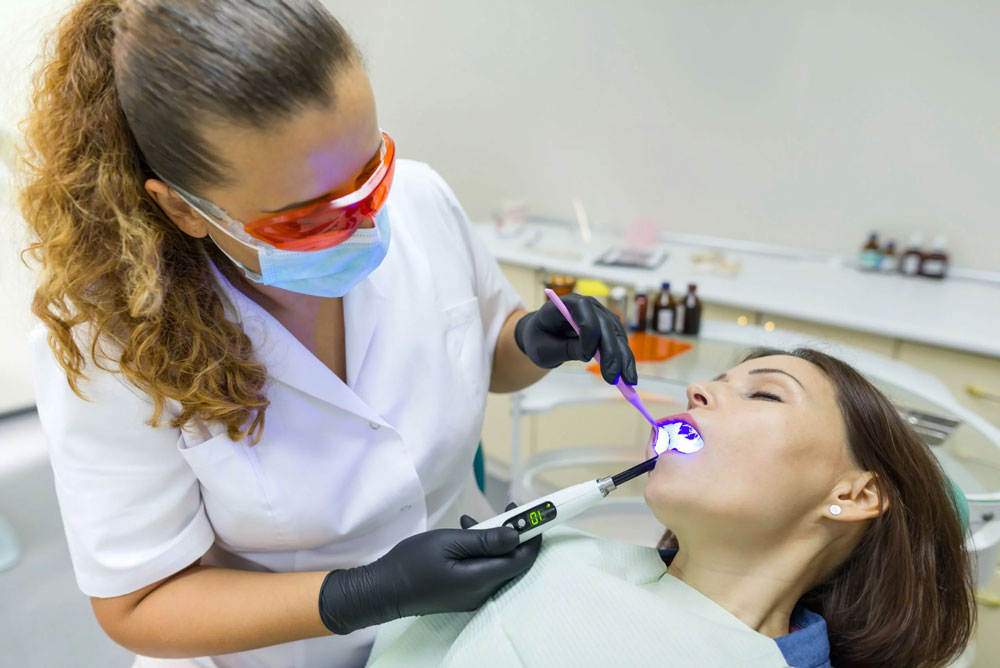
Sedation Can Ease Dental Anxiety
Going to the dentist is one of the most important things you can do to maintain your oral health. However, thanks to movies and T.V., people have a general fear of the dentist. They believe that going to the dentist will be a painful experience, even if they’re going to get their teeth cleaned. People often deal with dental anxiety, which keeps them from the dentist entirely.
If you let this anxiety and fear control you, your teeth won’t get the proper treatment they need. Visiting your dentist for a routine exam is the best way to catch any dental issues before they become worse. However, how can someone receive treatment if they’re too anxious about going to the dentist?
Cosmetic & Family Dentistry of Las Colinas understands that going to the dentist and receiving oral health treatments can be a stressful and anxiety-inducing experience. That is why we believe in providing options to our patients that help them feel more comfortable and at ease. Sedation in dentistry is an excellent way to ease your dental anxieties, allowing you to receive the treatment you need.
At Cosmetic & Family Dentistry of Las Colinas, we value the importance of seeing the dentist. However, we also understand many people have worries and fears when it comes to receiving dental treatment. That is why we offer sedation to ease patients’ anxieties. We also understand the concerns surrounding sedation. Give our clinic a call today, and we’ll be more than happy to answer your questions.
What Is Sedation?
As we mentioned earlier, many patients have dental anxiety. Often, this anxiety keeps patients from even stepping foot into a clinic. Sedation dentistry involves the use of medication to help relax patients undergoing dental procedures. While people often think of sedation during major procedures (such as getting veneers and root canals), it is even used for simple dental cleanings.
Many people refer to sedation as “sleep dentistry,” but that is not entirely true. While in many procedures, dentists use sedation to put patients under (such as wisdom teeth removal), but some patients’ anxiety is so bad that they need sedation to help them relax and feel more comfortable receiving treatment.
While people only think of sedation in dentistry for invasive procedures, it is an excellent tool to help patients overcome their dental anxiety. However, as we’ve hinted at, there are different levels of sedation.
Levels of Sedation
Different scenarios call for different levels of sedation. You don’t need to be asleep for a simple dental cleaning, and you certainly shouldn’t be awake for a tooth extraction. There are different levels of sedation that each have a place in dental treatment.
- Minimal: you are awake but in a relaxed state
- Moderate: you are awake, but the sedation is strong (often referred to as conscious sedation); you may slur your words, be drowsy, and might not remember much of the procedure
- Deep: you are on the edge of consciousness, but someone can still wake you
- General Anesthesia: complete unconsciousness
Each patient is different. Their bodies respond to certain medications differently. Fortunately, at Cosmetic & Family Dentistry of Las Colinas, we take everything into consideration when applying sedation dentistry, from medical history to body weight. Our team has years of experience and knowledge to safely administer the correct level of sedation to keep our patients safe.
Types of Sedation in Dentistry
Everyone’s body works differently and reacts to medications differently. Because every patient is different, we do not believe in one solution to sedation. Our top priority is the health and safety of our patients. We always take a thorough look at their medical history, vitals, and much more to ensure our patients are safe.
To ensure that we can treat every patient, our Dallas clinic offers more than one dental sedation service. Some of which include:
- Nitrous Oxide: Also referred to as “laughing gas,” nitrous oxide is probably the most well-known type of sedation in dentistry. Patients will inhale nitrous oxide combined with oxygen through a mask or an inhaler in the nose. This gas calms your body, allowing you to relax. It also wears off quickly and is the only type of sedation where you can drive home after.
- Oral Sedatives: Outside of nitrous oxide, our dental clinic also offers oral sedatives. Depending on the dose you are given, the effects can range from minor to moderate, often making you feel drowsy. This sedation can come in the form of a pill or general anesthesia, depending on the need. Much like nitrous oxide, it will also provide you with relaxing benefits.
- IV Sedatives: Another option is through intravenous (IV) sedatives. It involves applying sedatives directly into the veins. This sedation will be able to provide you with a calming effect and make you feel more comfortable. IV sedation is often referred to as “twilight sedation.” You are less aware of your surroundings, feel drowsy, and might not remember much of the procedure. In some cases, your dentist might use it to put you in a deep sleep.
How Safe Is Sedation in Dentistry?
As with all forms of medication, there are risks of sedation in dentistry. Because of the nature of the method, it can lead to disastrous results if the one administering the anesthesia or sedatives does not possess adequate training and qualifications. Fortunately, the dental health professionals at Cosmetic & Family Dentistry of Las Colinas do.
However, there are risks and side effects with sedation, such as:
- Nausea
- Dizziness
- Dr.Owsiness
- Impaired motor skills
- Slow reflexes
- Minor memory loss
- Headaches
These are minor side effects that will quickly go away. Sedation in dentistry is a safe option for people with a low pain threshold, sensitive teeth, strong gag reflexes, need extensive dental work, or have dental anxiety.
To ensure your safety, a trained and qualified professional will review your medical history, looking for any risk factors (such as obesity or obstructive sleep apnea). They will also ask what medications you are taking to help them determine if you are a candidate for sedation.
Your dentist should also inform you of the dose you are receiving, as well as going over any side effects and risks you might experience. Do not be afraid to ask questions. Your safety is our highest priority. If you are interested in sedation in dentistry and have questions, give Cosmetic & Family Dentistry of Las Colinas a call today, and we will be happy to answer them.
- Awareness16
- Bad Breath1
- Bone Grafting1
- Braces4
- Causes, Symptoms, And Treatments6
- Cavities5
- Chewing Gum1
- Cosmetic Dentistry of Las Colinas15
- COVID-192
- Deep Cleaning7
- Dental Anxiety1
- Dental Bridge2
- Dental Care27
- Dental Cleaning6
- Dental Crown1
- Dental Filling1
- Dental Health24
- Dental Implants6
- Dental Sedation1
- Dental Visit1
- Dental X Ray3
- Floss1
- Gum Dieseases4
- Injury1
- Insurance1
- Invisalign8
- Oral Cancer1
- Oral Hygiene24
- Root Canal9
- Sleep Apnea2
- Tartar1
- Teeth19
- Thanksgiving1
- TMJ1
- Tongue1
- Veneers2
- White Teeth12
Get Your Best Smile With Us
